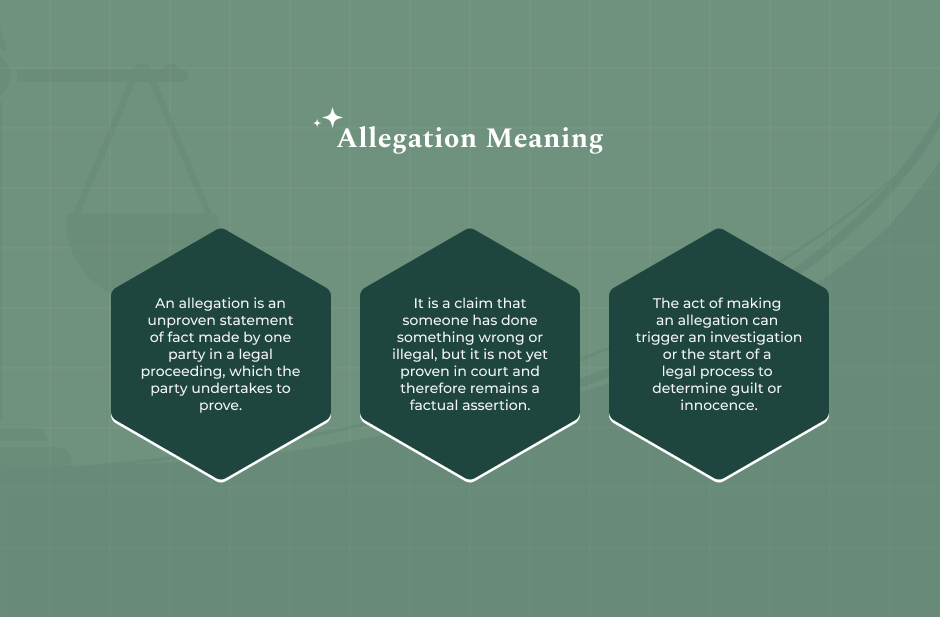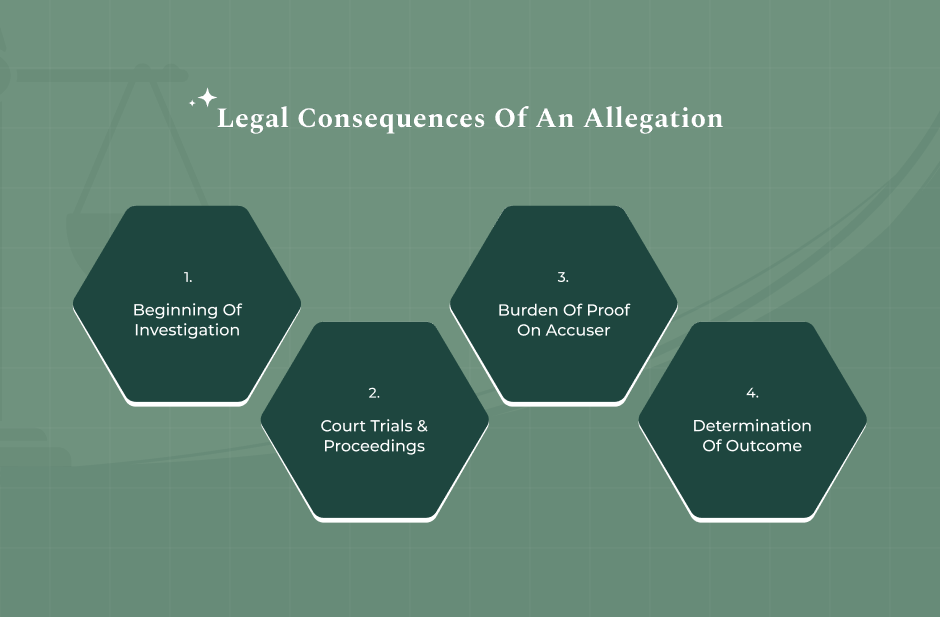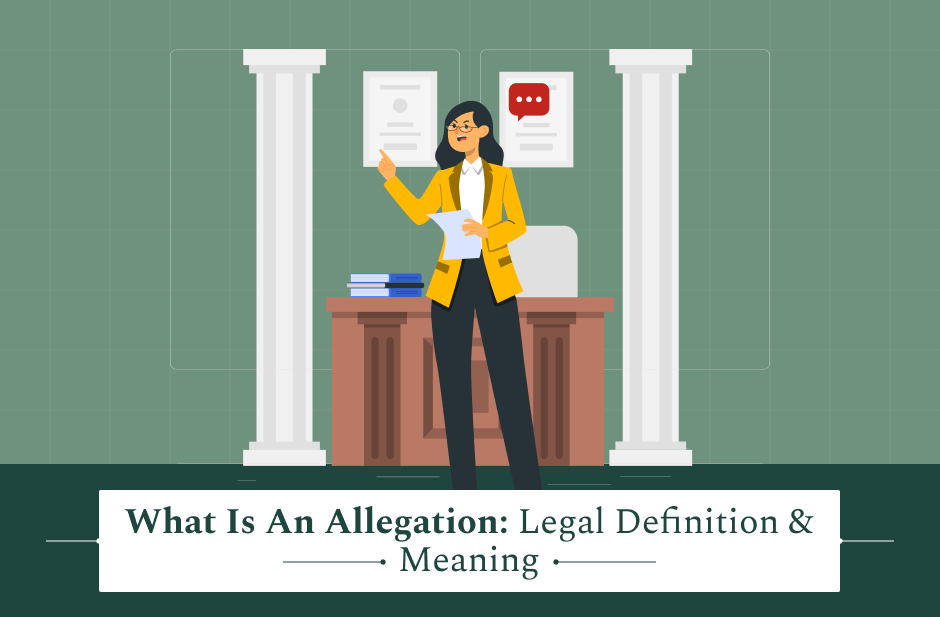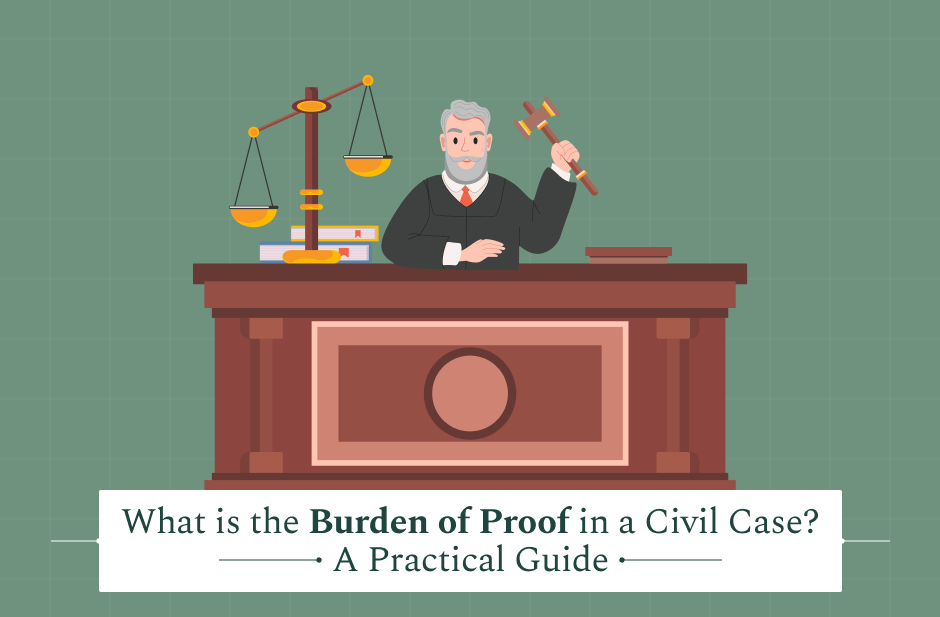Irrespective of whether it is a civil, criminal, or administrative dispute, one often sees term allegation used. It is central in pleadings, hearings, and media coverage of cases. Yet many readers confuse it with proven facts, verdicts, or judgments.
Understanding what an allegation really means, its types, how it arises, and what legal consequences it carries is essential both for legal professionals and for anyone following or involved in litigation.
In this article, I will talk about the following things:
- What is an allegation?
- What are the types of allegations in court?
- Key aspects or elements of an allegation.
- The legal impact of an allegation.
Additionally, I will also answer some of the questions that people also ask about when searching for what is an allegation in criminal cases. So, if these are some of the things that you want to know, keep on reading this article till the end…
What Is An Allegation?

An allegation is essentially a claim or assertion made by one party in a legal context, stating that something is true—usually of facts or wrongdoing—but without having yet provided proof.
Justia defines it as the “action of asserting something to be true, especially in a formal setting,” or a “declaration or claim that is not confirmed or established.” It is an assertion in pleadings (complaints, answers, or defenses) or other legal statements that certain facts exist, or that certain events occurred.
According to US Legal Forms, most people often think that “an allegation is the same as a proven fact.” However, until evidence is introduced, the allegations remain unproven.
To give you an example, in a civil lawsuit, a plaintiff may allege that the defendant negligently caused their injury. That is an allegation. It does not become part of the legal truth until or unless proven.
In criminal law, the prosecution alleges that the accused committed certain acts or had certain mental states (intent, knowledge, etc.), but again, these remain unproven until the trial, as per the US Legal Forms.
What Are The Types Of An Allegation?
DePaul College of Law mentions that an “allegation is a party’s assertion concerning a factual matter.” Now, it is important for you to understand that the legal doctrine distinguishes among several types of allegations, characterized by what they assert and at what level.
These types help courts and advocates see what needs to be proved and what may be struck out as insufficient. Additionally, the Federal Bar Association states that the legal systems vary in how they require pleadings to distinguish among these (e.g., “notice pleading” v.s “fact pleading”).
Some of the common types are as follows:
Legal Conclusions
These are statements that assert what the law is or what legal rule applies. For example, “Defendant was negligent” or “Defendant breached fiduciary duty.” Such statements often require underlying factual allegations to survive legal scrutiny.
Ultimate Facts
These are the central facts that must be shown to establish a cause of action or defense. They are what the law demands to prove the legal claim. For example, in negligence, some of the things that can act as allegations include:
- Duty.
- Breach.
- Causation.
- Harm.
Evidentiary Facts (Subsidiary Facts)
Facts that support the ultimate facts. For example, witness testimony, documents, and circumstances. These are not by themselves the cause of action, but help build the case.
Extraneous Detail
Facts or statements that may be included in pleadings but are not necessary to prove the legal claim. They are neutral or irrelevant to the core cause or may just add context.
What Are The Key Aspects Of An Allegation?
Understanding what components make up or accompany an allegation helps in assessing its strength and clarity. Key aspects include:
- Pleading Role & Formality
- Clarity and Specificity
- Unproven Status Until Evidence
- Burden of Proof & Standard
Consequences of Failure or Success: If allegations are not adequately pleaded, or if a party cannot meet the required proof, they may be dismissed, or lead to summary judgment or acquittal. If proven, they may lead to legal liability, damages, penalties, etc.
How Does An Allegation Happen?
There are several legal stages in the legal process where an allegation might arise. Some of these that you should know about are as follows:
Pleadings / Complaints
A plaintiff (or prosecuting authority) files a complaint or charging document alleging facts and wrongdoing. Defendants respond, often denying some allegations and may raise counterclaims or defenses. Allegations are thus embedded in initial processes.
Pre-Trial And Investigation
Investigations, affidavits, and statements often contain allegations—some formal, some informal. These can lead to formal charges or to negotiation or settlement. Allegations may arise from regulatory bodies or oversight agencies, too.
Public Claims & Media
Sometimes allegations are made outside court—for example, by the media, whistle-blowers, or regulatory filings. These may later form part of litigation or regulatory action. Though not proven, they can put pressure on parties.
Defendant’s Response
The defendant may also make allegations—for example, in asserting defenses, counter-claims, or pointing out facts that they believe the plaintiff must prove but cannot.
What Are The Legal Impact Of An Allegation?

Now that you know what is an allegation in a legal setting, let me emphasize one thing: these are not just statements. Rather, an allegation carries a lot of potential weight depending on how it is handled in court.
Here are some of the key legal impacts of an allegation that you need to know about:
1. Triggering Legal Proceedings
Allegations in a complaint or charge are what set the legal process into motion. Without allegations, there is nothing to defend or investigate. They define the scope of what is in dispute.
2. Framing The Issues
They frame what facts must be proved and what legal issues must be decided. The allegations shape discovery, evidence production, witness examination, etc.
3. Standards Of Proof Influence Outcomes
Because certain standards must prove allegations, some allegations fail simply because the standard is too high. For example, McCutcheon & Hamner state that an allegation in a criminal case may not succeed if the evidence does not meet the “beyond reasonable doubt.” In contrast, a civil allegation might succeed on “preponderance.”
4. Reputational And Practical Consequences
Even unproven allegations can harm reputations, cause business losses, or affect relationships. They may lead to regulatory investigations and public scrutiny.
5. Legal Defenses & Motions
Defendants may file motions to dismiss or strike allegations that are conclusory, insufficiently detailed, legally invalid, or fail to state a claim. Additionally, according to the Federal Bar Association, courts often distinguish between factual allegations and mere legal conclusions; the latter may be dismissed if unaccompanied by supporting facts.
6. Collateral Effects In Parallel Proceedings
Criminal allegations and civil claims sometimes run in parallel. A verdict in one may influence the other (e.g., evidence already tested, provisions on admissibility). An acquittal does not necessarily prevent civil liability but may make civil success harder; conversely, a conviction can strengthen civil claims.
Frequently Asked Questions (FAQs):
Here are some of the questions that people also ask when they are searching for what is an allegation in the legal context. Take a look at them before you leave:
1. Is An Allegation The Same As A Proven Fact?
No. Allegations are unproven assertions. They must be proved with admissible evidence and satisfy the legal standard. Until that happens, they remain allegations, not facts.
2. Can An Allegation Be Dismissed Before Trial?
Yes. Suppose the pleading fails to state sufficient facts. In that case, if it is merely conclusory without relevant support, or violates procedural requirements, a court may dismiss or strike the allegation (or the whole claim) in pre-trial motions.
3. If Someone Is Acquitted Criminally, Can They Still Be Found Liable In Civil Court For The Same Allegation?
Yes. Because standards of proof differ, a criminal acquittal does not always prevent a civil lawsuit for the same underlying act. For example, someone acquitted in criminal court may still lose in civil court if the civil court finds the evidence meets its lower standard.
















